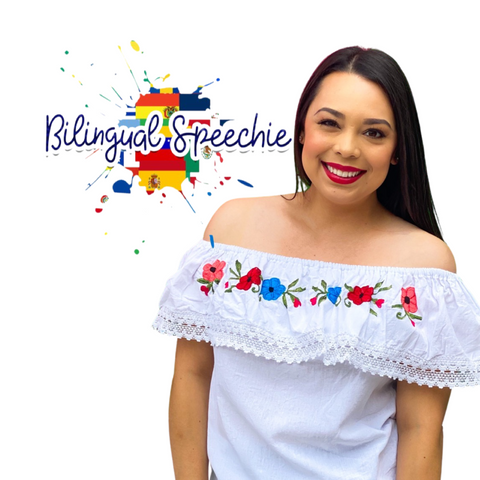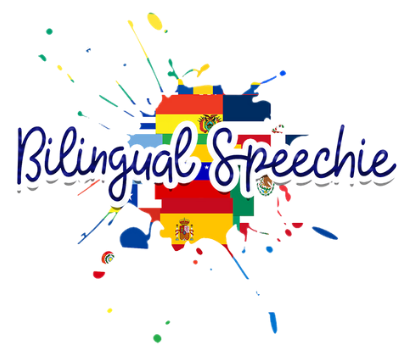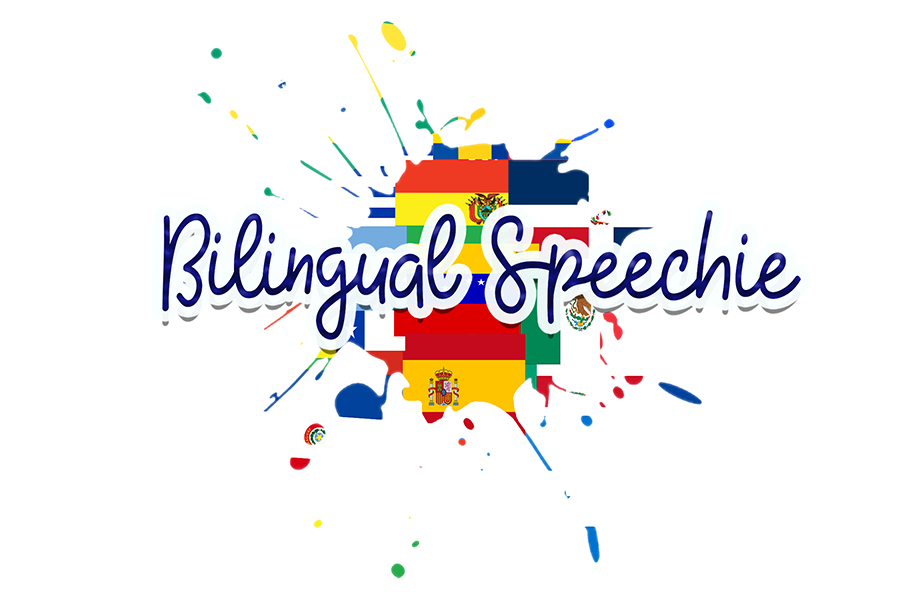by Liliana Diaz December 14, 2023
Do you have a bilingual AAC user on your caseload? Perhaps you have been receiving questions from the student's family and/or teacher on whether the student should have both languages present on their AAC system, and you're not quite sure where to find resources? Well you came to the right spot because here are some facts that all educators, families and SLPs should know about when working with bilingual AAC users.
Plain and simple, ALL bilingual AAC users should ALWAYS have access to both languages on their AAC systems, and here's why:
Everyone, including bilingual AAC users, have the right to communicate in the language(s) they want, like and prefer. Verbal bilinguals can pick and choose which language they want to communicate in at any point in time, and bilingual AAC users should have that option as well. Communication and one's home language are interconnected and they are an essential piece of one's identity. When restricting a student from their home language, you are taking more away than just his/her language, you are taking a piece of who they are as a person.
Bilingual AAC users have the right to be successful in all environments and with all communication partners, including with their family IN THEIR HOME language. In order for our students to be successful with their communication systems, they must be able to communicate in a variety of environments. Our students spend a large majority of their time at home with their family. It is essential that their family are a part of the language learning process otherwise factors such as family buy-in to use the system, the carry-over of goals, motivation to use the AAC system, the exposure to rich language models, and all interactions are all hindered.
Bilingual AAC users have the right to code-switch whenever they deem necessary. Code-switching and code-mixing is a key component and natural process in bilinguals. Bilingual AAC users should be allowed the opportunity to naturally code-switch, gain access and learn new vocabulary in their home language and access both linguistic repertoires at any given point in time.
Communication impairment should never be a reason why an individual who experiences complex communication needs becomes marginalized. Unfortunately many people with disabilities, who also come from culturally and linguistically diverse backgrounds, are often deprived of bilingual supports, dual language learning, and access to their home language for a variety of reasons. One reason is often due to the perceived severity of their disability, as well as the belief that adding another language to their mental capacity is beyond their learning load; however, this is a completely incorrect way of thinking, and research has proved otherwise. Bilingual people with a variety of disabilities, including communication impairments, are capable of becoming bilingual, speaking two languages and/or learning another language.
With forced monolingualism come many harmful consequences. Depriving bilingual AAC users of the opportunity to learn and use both languages is harmful to their language learning, culture and family dynamic. Oftentimes, I have seen families lose complete communication at home due to language loss. In addition, language and culture are also interconnected and as a result, depriving them of their home language puts the AAC user at risk of losing their cultural identity.
Here are some resources/references that you can read to learn more about this topic and help you advocate for your student/client:
McNamara, E. (2018). Bilingualism, Augmentative and Alternative Communication, and Equity: Making a Case for People With Complex Communication Needs. Perspectives of the ASHA Special Interest Groups, 3(12), 138-145. https://doi.org/10.1044/persp3.SIG12.138
Soto, G. (2018). Introduction to the Special Issue on Cultural and Linguistic Diversity and AAC. Perspectives of the ASHA Special Interest Groups, 3(12), 136-137. https://doi.org/10.1044/2018_PERS-SIG12-2018-0013
Soto, G. (2012).Training Partners in AAC in Culturally Diverse Families. Perspectives of the ASHA Special Interest Groups, 21(4), 144-150. https://doi.org/10.1044/aac21.4.144
Chabon, S., Esparza-Brown, J., Gildersleeve-Neumann, C. (2010). Ethics, Equity, and English-Language Learners: A Decision-Making Framework. The ASHA Leader, 15(9). https://doi.org/10.1044/leader.FTR1.15092010.10
Comments will be approved before showing up.
by Liliana Diaz July 23, 2023
Have a client on your caseload that is demonstrating difficulty producing the CH sound? Perhaps you're a parent whose child is in speech therapy working on the CH sound? The CH sound can be a tricky sound to teach because it's hard to visually see what's going on inside the mouth when saying the sound. But no worries, here are some tips to help achieve that tricky CH sound.
by Liliana Diaz February 13, 2023 1 Comment
by Liliana Diaz January 12, 2023
Perhaps you recently got assigned to a new school or site that consists of a large bilingual and/or multilingual caseload, and perhaps you're not bilingual. Not speaking the student's language can be quite overwhelming and stressful (trust me, I've been there!). I know the feeling of not quite knowing where to start in intervention, or not knowing how to support your students. Well luckily, bilingual SLP, Ingrid Owens-Gonzalez has some important tips to share with all SLPs. Here are 3 things Monolingual SLPs can do to support bilingual populations today.

Who are we?
Bilingual Speechie LLC. is a small business dedicated to providing inclusive and engaging speech therapy resources and activities for bilingual children, parents, SLPs and educators.
Bilingual Speechie LLC promotes bilingualism and multilingualism by dispelling common myths, providing education on bilingual language development, and promoting heritage language maintenance amongst bilingual families.
About the Owner:
Liliana Diaz-Vazquez is a certified licensed bilingual speech language pathologist (SLP), currently practicing in Chicago, Illinois. She obtained her bachelor’s degree in communication disorders (2012) and her master’s degree in speech language pathology at Saint Xavier University (2014). She is a certified member of the American Speech-Language and Hearing Association (ASHA) since 2014, a member of the Illinois Speech and Hearing Association (ISHA) since 2014 and maintains licensure in the state of Illinois.
Liliana is a first-generation Mexican-American Latina, a small business owner, a full-time school-based SLP, & a bilingual parent, who takes pride in her roots, culture, & heritage language. She loves being able to share her experience as a Latina SLP, and a bilingual mom, as well as her culture & heritage language with the educator, SLP, and parent community.
Liliana Diaz-Vazquez has extensive experience working with the bilingual English and Spanish speaking population & multilingual population. She specializes in augmentative/alternative communication (AAC), bilingual language development and language delays/disorders in bilingual/multilingual children. She has also worked in the early intervention setting for several years where she gained vast experience working with interpreters and bilingual/multilingual families.
Liliana began creating digital bilingual resources and activities in 2014 out of need while working full-time in the school setting as a SLP. Liliana worked with many Spanish-speaking families and quickly realized that there were limited Spanish and bilingual speech therapy resources available for her students and their families. In addition, Liliana quickly became aware that there was a need for education about bilingualism and typical bilingual language development as many of the families she worked with had encountered misinformation about bilingualism. Liliana began developing resources and eventually started Bilingual Speechie LLC with the mission to provide education to SLPs and families about bilingualism, as well as provide inclusive and diverse materials for speech therapy in order to help bilingual families and SLPs gain access to appropriate bilingual materials for children with communication disorders.
Today Liliana currently works full-time in the Chicago public school setting as a lead bilingual SLP where she consults and collaborates with SLPs daily to help them understand how to assess and provide culturally and linguistically appropriate services for bilingual and/or multilingual students. She also runs her small business, Bilingual Speechie LLC, and is on a mission to expand and grow her business so that all SLPs, educators, and families can have access to inclusive, diverse, and bilingual resources in a variety of languages for speech therapy.
Professional Development:
Liliana has vast experience as a speaker/presenter and has presented at several conferences over the years. You can view all previous conferences and topics that Liliana has presented on here. Liliana is available to present on topics such as best practices when working with multilingual populations, bilingual speech/language assessment and treatment, goal writing with multilingual populations and much more. If you are interested in booking Liliana for a conference or event please don't hesitate to send an email at lilianadiaz@bilingualspeechie.com
 English
en
English
en
 English
en
English
en


Liliana Diaz
Author